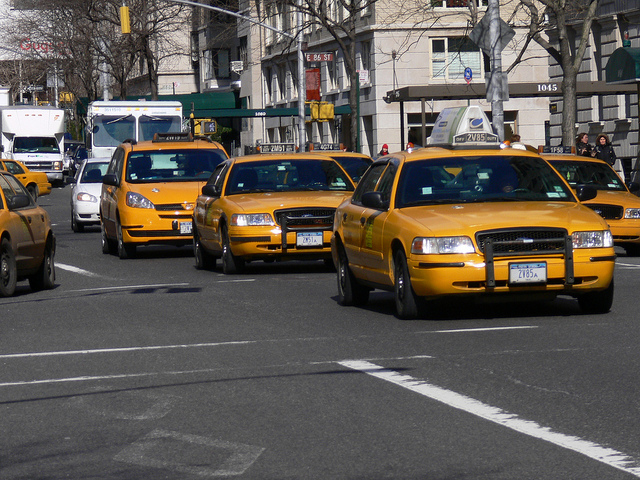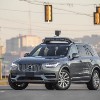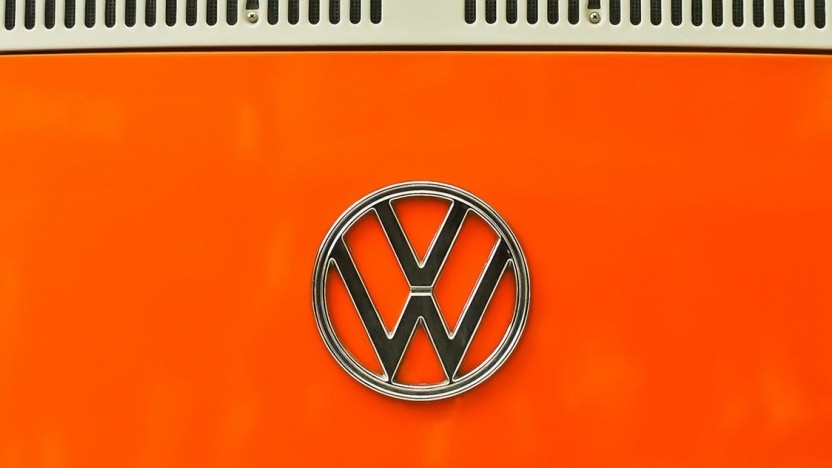A Wal-Mart employee pushes grocery carts at a store in Miami.Getty ImagesWhen most people think about how self-driving cars will help retailers, the image that comes to mind often is a robot car whisking a delivery to a customer's door, but according to an article in Bloomberg the reality — at least in the near term — will be different.
Analysts cited by the news service estimate the market for transporting goods on a fixed route from warehouse to warehouse using driverless vehicles could reach $1 trillion. These miles in the middle help get goods closer to their final destination.
Walmart, which has experienced a boom in online sales, will begin using robot cars to transport goods in between warehouses, in the hopes that the company will be able to cut costs and increase efficiency.
Walmart spokeswoman Molly Blakeman told CNBC the retailer is working with its partner Gatik, a self-driving vehicle startup, to test out a self-driving vehicle. It will travel along a two-mile route in Bentonville, Arkansas between two stores.
“We are working with city and state officials to obtain the approval we need to operate and plan to start the pilot program this summer with the aim being to learn about the logistics of adding AVs into our ecosystem, operation and process changes, and more opportunities to incorporate this emerging technology,” Blakeman said.
Consumers have grown wary of robot-taxis due to accidents like the killing of a pedestrian last year by Uber's new test car, Bloomberg reported.
The robo-trucks also take out the human element, eliminating the hassle of human passengers and the cost to create a passenger compartment in the first place.
With the rise of online shopping, the robots also fill a huge demand for truck drivers. A shortage of drivers has led to 60,000 unfilled long-haul positions, according to data Bloomberg cited from the American Trucking Association.
Read the full Bloomberg story here.
VIDEO3:5003:50Walmart announces an in-home grocery delivery serviceSquawk Box
Tag: Uber
North Carolina Cab Driver Creates Ride-Hailing App
Jerry Crosby, a driver with Yellow Cab of Charleston, got the idea when Uber and Lyft starting operating in his city a few years ago. Photo via Marcin Monko/Flickr. A cab driver in Charleston, N.C., is panning to launch his own version of a ride-hailing app this summer, The Post and Courier reports. Jerry Crosby, a… Continue reading North Carolina Cab Driver Creates Ride-Hailing App
Still in stealth mode, Duffel raises $21.5m in Series A from Benchmark for its travel platform
Ten months ago London startup Duffel hinted that it would be “a new way to book travel online, aiming at the booking experience ‘end to end’”, and announced a healthy $4.7M funding round, but not much else. Today it goes further, announcing a $21.5m in Series A funding from US VC giant Benchmark, which also… Continue reading Still in stealth mode, Duffel raises $21.5m in Series A from Benchmark for its travel platform
Most SoftBank Vision Fund investors want to join second fund, says Son
Most investors in SoftBank Group Corp’s $100 billion Vision Fund want to join the group’s forthcoming second fund, founder and Chief Executive Masayoshi Son said on Wednesday, adding discussions would begin soon. The entrepreneur said in May a second fund would launch “soon”, with SoftBank likely to be the only investor initially. Raising further funds… Continue reading Most SoftBank Vision Fund investors want to join second fund, says Son
Domino’s teams up with Nuro for driverless pizza delivery in Houston – The Verge
Nuro, the self-driving delivery startup, is teaming up with Domino’s to launch a pilot for driverless pizza delivery in Houston, Texas, the companies announced Monday. Starting later this year, Domino’s will use Nuro’s driverless fleet of custom-built robot cars to deliver pizza to select Houston residents who place orders online. Nuro, which was founded by… Continue reading Domino’s teams up with Nuro for driverless pizza delivery in Houston – The Verge
Uber ATG enters two new collaborations with leading US research institutions
Uber ATG enters two new collaborations with leading US research institutions UberATGBlockedUnblockFollowFollowing Jun 18 Our team at Uber Advanced Technologies Group (ATG) is building high-performance self-driving technology with safety at the core of everything we do. Our foundational commitment to safety leads us to continually test new techniques, deploy new technology, and forge partnerships with… Continue reading Uber ATG enters two new collaborations with leading US research institutions
Volvo teams up with Nvidia to develop self-driving commercial and industrial trucks
Volvo and Nvidia announced a new partnership today aimed at developing the next-generation decision-making engine for Volvo Group’s fully autonomous commercial trucks and industrial service vehicles. The partnership will use Nvidia’s Drive artificial intelligence platform, which encompasses processing data from sensors, perception systems, localization, mapping and path prediction and planning. Volvo already has some freight… Continue reading Volvo teams up with Nvidia to develop self-driving commercial and industrial trucks
Uber to retain Careem brand for now -Careem CFO
FILE PHOTO: An employee shows the logo of ride-hailing company Careem on his mobile in his office in the West Bank city of Ramallah July 17, 2017. Picture taken July 17, 2017. REUTERS/Mohamad Torokman DUBAI (Reuters) – Uber and Middle East ride-hailing business Careem will remain separate entities until at least the first quarter of… Continue reading Uber to retain Careem brand for now -Careem CFO
Cars: Until the VW robot car it takes “a few more days”
Volkswagen has created a new board position: the software board. He sees the autonomous driving still in the distance. June 18, 2019, 7:45 am, Andreas Donath Volkswagen does not expect a quick break in autonomous driving (Image: Pexels /CC0 1.0) Tesla boss Elon Musk thinks autonomous driving is still in to be able to offer… Continue reading Cars: Until the VW robot car it takes “a few more days”
Domino’s serves up self-driving pizza delivery pilot in Houston
Domino’s really emphasizes its commitment to ‘innovation,’ but even if it’s a marketing tactic, the global pizza brand does indeed walk the walk. Case in point: It’s launching a new pilot for self-driving pizza delivery in Houston in partnership with Nuro. Autonomous driving tech startup Nuro was founded by Dave Ferguson and Jiajun Zhu, two… Continue reading Domino’s serves up self-driving pizza delivery pilot in Houston


